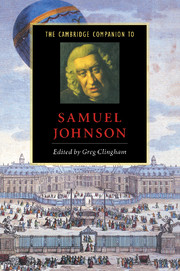Book contents
- Frontmatter
- Introduction
- 1 Extraordinarily ordinary
- 2 Johnson and the arts of conversation
- 3 Johnson's poetry
- 4 Johnson, the essay, and The Rambler
- 5 Johnson and the condition of women
- 6 Johnson's Dictionary
- 7 Johnson's politics
- 8 Johnson and imperialism
- 9 The skepticism of Johnson's Rasselas
- 10 Shakespeare
- 11 Life and literature in Johnson's Lives of the Poets
- 12 Johnson's Christian thought
- 13 “From China to Peru”
- 14 “Letters about nothing”
- 15 Johnson's critical reception
- Further reading
- Index
14 - “Letters about nothing”
Johnson and epistolary writing
Published online by Cambridge University Press: 28 May 2006
- Frontmatter
- Introduction
- 1 Extraordinarily ordinary
- 2 Johnson and the arts of conversation
- 3 Johnson's poetry
- 4 Johnson, the essay, and The Rambler
- 5 Johnson and the condition of women
- 6 Johnson's Dictionary
- 7 Johnson's politics
- 8 Johnson and imperialism
- 9 The skepticism of Johnson's Rasselas
- 10 Shakespeare
- 11 Life and literature in Johnson's Lives of the Poets
- 12 Johnson's Christian thought
- 13 “From China to Peru”
- 14 “Letters about nothing”
- 15 Johnson's critical reception
- Further reading
- Index
Summary
Cicero describes a poet who, undeterred by losing his audience, continues his recitation to the end: “Plato alone is as good as a hundred thousand,” the poet declares. It is no surprise that this tale of merit's endurance in a hostile age should have lodged in Johnson's mind. “The Lecturer was surely in the right, who, though he saw his audience slinking away, refused to quit the Chair, while Plato staid,” he tells John Wesley (6 February 1776; Letters, II, 290 and n.). He later acknowledges a compliment from Hester Thrale with quieter reference to the tale: “There is some comfort in writing, when such praise is to be had. Plato is a multitude” (18 March 1779; III, 157).
To value a lone connoisseur as highly as a mass readership was not only to salvage pride in an overlooked work, nor was it simply to claim kinship with such other addressees of “fit audience . . . though few” as Milton. In the context of his correspondence with Hester Thrale (who elicited from Johnson no fewer than 373 surviving letters, including many of his finest), it was also to suggest that private genres like the letter itself could count for as much as literature printed and bound.
- Type
- Chapter
- Information
- The Cambridge Companion to Samuel Johnson , pp. 224 - 239Publisher: Cambridge University PressPrint publication year: 1997



